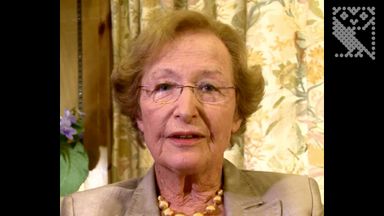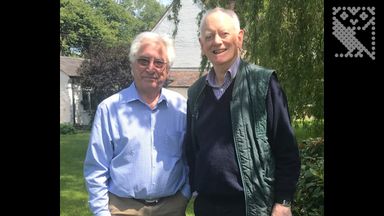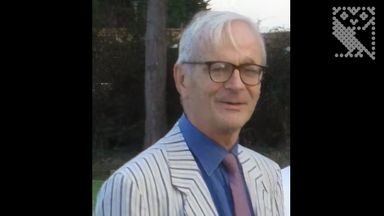The BBC Computer Literacy Project Interviews
John Radcliffe (Executive producer)
Clips from this programme
When did you first get involved with Microelectronics and the Computer Revolution? Villiers House, Executive Producer. Horizon ' Now the Chips are Down' (Producer Edward Goldwyn) led to much discussion in the BBC Continuing Education department in 1978. Sheila Innes ( BBC Controller Educational Broadcasting), Manpower Services Commission (MSC): Broadcasting must help by making more programmes (informed by David Allen's and Robert Albury's report from a world tour). The impact of new technology on people, then the use of the technology by people. (John Radcliffe with David Allen)
Duration: 03:47What influence did the government have on what we were planning to do? Consultative meetings in 1979 with government departments (educational and industrial) came with a positive attitude from government for the major project. Horizon ' Now the Chips are Down' was viewed by the cabinet (John Radcliffe with David Allen)
Duration: 01:44What is Computer Literacy? Encouraging people to program as a hands-on activity for their improved view of the technology. A need for a series with a linked microcomputer with a good software standard became clear, to encourage interest into an ongoing learning process, learning to program. A need for a new microcomputer for hands-on experience with a software standard. (John Radcliffe with David Allen)
Duration: 04:57A BBC Microcomputer - Ray Kernow (Science Policy Research Unit, Sussex) & John Cole (Chairman of Microcomputers in Secondary Education (MUSE)) influence toward structured ABC (Adopted Basic for Computers) - Manufacturers were to accept ABC on existing machines if the Department of Trade and Industry (DTI) paid for the cost. The machine wanted had to be a good one, with colour and one that could be used in Television Studios. The 1980 requirement specification for a machine from a British Manufacturer. Funding questions arose along with BBC questions about why one was needed at all: BBC Engineering involved, DTI consulted on who might make such a machine, bids from 6 of those 7 named, Acorn chosen from these, but benefiting all. (John Radcliffe with David Allen)
Duration: 08:11The role of BBC Engineering in the project, using the BBC microcomputer for such things as set-top box use and telesoftware, and ensuring that the computer would be excellent (David Kitson). Education officers, an advisory council for adult education along with the BBC made a strong educational network. (John Radcliffe with David Allen)
Duration: 05:08The television series, The Computer Programme, needed a working BBC Microcomputer- This series' transmissions were delayed from September 1981 to allow a reasonable time, until January 1982. A working machine, not quite with ABC but a good BASIC, needed some development time. The first studio machines were wire-wrapped early prototypes, ULAs needing cooling, and caused some recording delays. Release dates of the computer and its support material for public sale was also delayed. Chris Curry with 95% failing early chips (due to heat) needed a re-design before the machines could be released. (John Radcliffe with David Allen)
Duration: 09:51The Department of Trade and Industry (DTI) ministers (Kenneth Baker, Patrick Jenkin etc) sitting in front of the BBC Microcomputer after the BBC Micro launch, with the BBC Micro Welcome tape ('It's a bit like a typewriter!'). 1982: The year of Information Technology. Margaret Thatcher and her government were 100% behind this project. (John Radcliffe with David Allen)
Duration: 04:34Computer Education, the government supported Computers in Schools & Microcomputers in Education Programme (MEP) encouraging writing software for education with the vast majority of microcomputers chosen by schools being BBC Micros for a full education including the fundamental ideas. Margaret Thatcher, at a BBC Micro launch event, was shown Telesoftware used to transmit programs to schools via Telesoftware which became commercial for Bookmakers etc, pre- the internet. TVTel used the viewdata standards through the BBC Micro. Hermann Hauser, Steve Furber (Professor of Computing at Manchester University), Andy Hopper (Professor of Computing at Cambridge University) all went on to great things after Acorn. (John Radcliffe with David Allen)
Duration: 04:16The Audience Research into alternative ways into making programmes: Didactic, intriguing, interesting, door-opening, appealing to a general and/or specialised audience: The general audience was to be the target with a style of programme seen in The Computer Programme and Making the Most of the Micro. Up to 8 million people watched at least one of these programmes, enjoying the depth and breadth of coverage. All good public interest until the bottom fell out of the market in 1985. (John Radcliffe with David Allen)
Duration: 04:43The Micro Live Special, 2 hours on BBC1, Sunday morning, a feedback programme on the back of such strong public interest. 40 years ago with dedicated educational budgets, outside advisors, and resources, this was easier than it is now is in the BBC. We were 'just in that moment', and rose to the challenge, too. Within a few years public interest was dropping off. The BBC Micro was still good, despite the success of IBM and Microsoft. So much expandability in the BBC Micro, made it a special machine, with in-house BBC Engineering knowledge and support (Richard Russell).
Duration: 06:12With 3 Years of Micro Live that followed the early series, the project covered almost a decade of Information Technology all before the Worldwide Web. Despite mass adoption of a technology since, knowledge of the basics of computing is no better. Microsoft Office software, over-designed? The Make it Digital Project. Asa Briggs' concept of moments: In 1980-82 we were 'just in that moment' and rose to the challenge (Aubrey Singer in Toward Computer Literacy). (John Radcliffe with David Allen)
Duration: 04:23The BBC Computer Literacy Project Interviews
Sheila Innes, former BBC Controller Educational Broadcasting
First broadcast: 1st May 2018
Duration 09:45
Sheila Innes Head of Department and later Controller of Educational Broadcasting remembers origins and highlights of the project, recorded May 2018
John Radcliffe (Executive producer)
First broadcast: 14th May 2018
Duration 57:47
John Radcliffe (Executive producer and later Head of Open University Productions) and David Allen (project editor) In conversation in May 2018, remembering the Computer Literacy Project 40 years on.
Now playing
David Kitson (Head of Transmission Group within BBC Designs Department)
First broadcast: 20th May 2018
Duration 19:40
David Kitson (Head of Transmission Group within BBC Designs Department) became responsible for monitoring the progress of the BBC micro computer in behalf of BBC Engineering.













